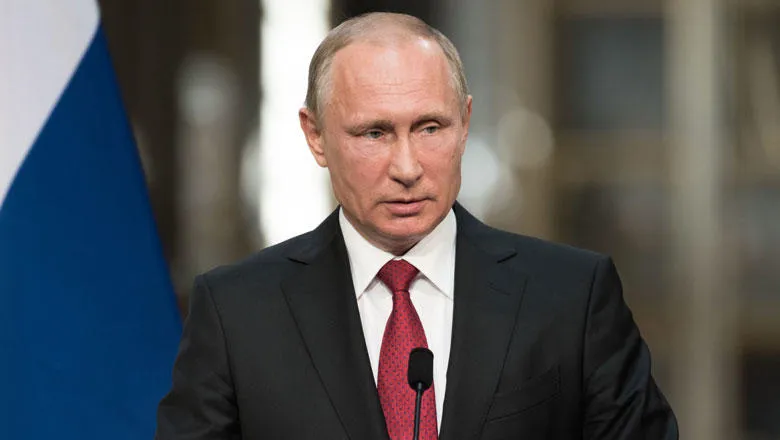Russia has suffered staggering casualties, and there are rampant accounts of dreadful troop morale. Even if the Russian military is able to secure a short-term operational victory through grinding attritional warfare, the sheer quantity of personnel required to maintain an effective counter-insurgency presence will be essentially impossible to generate.
Professor David Gioe
17 October 2022
Putin's war has turned back the clock on Russian power for decades, according to new analysis
The impact of Russia’s war in Ukraine in the long-term will likely reduce Russia to a position worse than when Putin assumed power 22 years ago, according to new analysis from the Department of War Studies at King’s.

Territorial gains in Ukraine are almost wholly irrelevant to Russia’s future, argues the paper, with Putin having negatively impacted Russian power internationally and domestically across the board.
Paper authors Professor David Gioe from the Department of War Studies, and former Ministry of Defence official William Styles said:
"Putin was well on his way to being remembered as the Tsar who made Russia great again, especially considering the chaos and disillusionment of the immediate post-Cold War decade. Yet, Putin will have lost far more than Ukrainian territories when the battlefield dust finally settles. There is no military, economic, intelligence, diplomatic dimension, and no aspect of Russian civil society, that will not be negatively impacted."
To understand the broad swath of repercussions Russia now faces, the paper examines the impacts of Putin’s miscalculation on various aspects of Russian foreign policy and national power.
It highlights how coordinated action by the West has effectively crippled Russia’s interaction with the global economy. Short-term manipulation of the money supply and greater access to Chinese and Indian markets may have suggested economic resilience. But Gioe and Styles argue that in the long-term the loss of lucrative European markets and supply chains, not to mention stunted innovation due talented young tech entrepreneurs fleeing Russia, will see the economy decline to a worse situation than even in the Soviet era, when Russia had its state-backed industrial base to fall back on.
If Putin were to retreat from Ukraine, the analysis suggests that the majority of sanctions will remain in place for the time being. In fact, they could be used as a punishment, as the US and Europe have called for Russia to be held accountable for its actions and so have its assets seized to help rebuild Ukraine.
According to the paper, the Russian military has lost vital assets, including part of its Black Sea Fleet of ships, hundreds of tanks and helicopters, dozens of fighter aircraft, air and artillery systems. It further argues that these can’t be easily or quickly replaced, with sanctions inhibiting Russian arms manufacturers from acquiring technological components such as microchips and guidance systems from abroad.
With Russia the second largest exporter of weapons in the world, this is also likely to hit the Russian economy, with the war showing how unreliable and vulnerable Russian kit really is. India and the Philippines have already cancelled deals for Russian helicopters and, Russia itself is now buying combat drones from Iran.
Furthermore, as Professor Gioe argues, the war has revealed that the Russian military is not as formidable, nor as employable as many analysts calculated:
The report also anticipates that protests over the tens of thousands of Russians killed and grievously wounded will eventually come, which could easily dwarf the previous mass protests across Russia by soldiers’ mothers.
Russia’s intelligence services are in disarray, according to the analysis. The Russian security service (FSB)’s inability to accurately assess the situation in Ukraine has severely undermined the previously dominant organisation’s reputation within Russia.
“Typically Putin’s favourite tool on the international stage, internal squabbling and blame shifting has severely damaged Russian intelligence capabilities.
“It has also faced considerable crises in the way of cyberattacks exposing vast swathes of data on the Kremlin’s security apparatus, Ukrainian executions of suspected Russian agents severely undermining Russian operations, alongside the expulsions of over 400 Russian officials from posts around the globe. This will impede Putin’s ability for years to come to conduct global intelligence operations, given the probable reluctance of Western countries to accept more Russian ‘diplomats’.”
For the long term, Putin has set the conditions for Russia’s perpetual decline. Professor Gioe said:
“Putin cannot stitch together enough tactical victories in Ukraine to translate his war into a strategic success given Russia’s faltering economy, crumbling military, chastened intelligence services, toxic international brand, dwindling demographics, and terrorised civil society.
“His blunder has caused catastrophic harm to Russia across every facet of statecraft in the short term, and, moreover, has imperilled Russian development and prosperity for the future.”
Read the full paper:
Gioe, D. V., & Styles, W. (2022). Vladimir Putin’s Russian World Turned Upside Down. Armed Forces & Society, 0(0). https://doi.org/10.1177/0095327X221121778
Professor David Gioe is a British Academy Global Professor at the Department of War Studies, King’s College London. Before this he spent over a decade of public service as an intelligence officer in the USA.
William Styles is a former Ministry of Defence official and a reserve intelligence officer in the British Army

